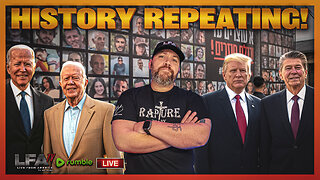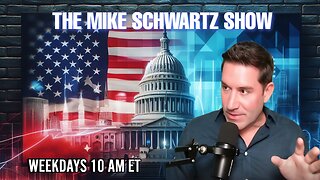Premium Only Content

Two-thirds of Americans are willing to eat meat grown in a lab
Two-thirds of Americans (67%) would eat cultured meat grown in a lab setting.
That’s according to a recent survey of 2,001 U.S. adults who are their household’s primary grocery shoppers, which discovered people have become more open to trying meat alternatives, with 58% willing to eat plant-based options such as tofu, tempeh, and seitan.
However, inflation is impacting three in four (75%) shoppers’ ability to pay for ethically produced products. About two-thirds (64%) also said they might opt for plant-based dishes and serve less meat for the holiday season due to the rising price of meat.
And 73% believe the past decade has changed how others view vegan and vegetarian stereotypes.
Conducted by OnePoll on behalf of Farm Forward, a nonprofit whose mission is to end factory farming, the research also revealed 73% “always” or “often” buy products labeled “organic,” “natural,” “humanely raised,” or “sustainable.”
The main reason? Half said these labels sound more ethical, meaning these products do not harm the environment and fairly support the suppliers, growers or producers.
One out of five shoppers don’t believe the meat they typically buy comes from factory farms, and 22% are unsure.
"Shoppers tend to believe wording on meat and dairy labeling is true but often it's humanewashing, meaning that the producer is trying to paint a false picture to play on people's desire for ethically raised food, " said Andrew deCoriolis, executive director at Farm Forward. "The vast majority of meat purchased in grocery stores comes from factory farms where conditions are crowded and filthy."
More than three in four people (78%) said they would be concerned if they found out that meat labeled “humanely raised” and “free range” comes from factory farms.
Six in 10 have recently considered making or already made more ethical food choices, including supporting fair trade, an arrangement designed to help producers in growing countries achieve sustainable and equitable trade relationships (45%).
Currently, 60% trust food labels such as “natural” and “organic,” with 43% saying they would trust them more if there was a government guarantee behind each one.
Eighty percent believe the government should do more to hold companies accountable for the claims they make about food products.
"The overwhelming majority of survey respondents (91%) placed the onus on the government to make brands prove they’re taking actual steps to live up to the claims on their food labels,” deCoriolis added. “It’s time for our government to take action and make brands live up to their labels.”
FOOD LABEL WORDS PEOPLE THINK THEY UNDERSTAND
Organic - 51%
Natural - 50%
Free-range - 47%
Raised without antibiotics - 45%
Cage-free - 45%
Pasture-raised - 44%
Humanely raised - 43%
Non-GMO - 42%
Sustainable - 42%
rBST-free - 28%
Survey methodology:
This random double-opt-in survey of 2,001 U.S. adults who are the primary grocery shoppers in their household was commissioned by Farm Forward between October 3 and October 17, 2022. It was conducted by market research company OnePoll, whose team members are members of the Market Research Society and have corporate membership to the American Association for Public Opinion Research (AAPOR) and the European Society for Opinion and Marketing Research (ESOMAR).
-
 1:22
1:22
SWNS
25 days agoResting gift face? Most fake their excitement during the holidays
46 -
 LIVE
LIVE
Benny Johnson
2 hours ago🚨 WATCH Pam Bondi BREAK Adam Schiff like a Pencil | Trump Confirmations Are On FIRE
8,982 watching -
 LIVE
LIVE
LFA TV
16 hours agoTRUMP GETS THE CREDIT! | LIVE FROM AMERICA 1.16.25 11am
4,704 watching -

Ron DeSantis
2 hours agoGovernor Ron DeSantis Makes an Announcement in Orlando
12.8K1 -
 1:17:36
1:17:36
Graham Allen
4 hours agoDADDY’S HOME! Trump Lands Hamas Hostage Deal!! While Biden Tries To Take Credit! PATHETIC
57.3K49 -
 2:44:31
2:44:31
Matt Kohrs
10 hours agoBreaking Market News, Markets Breakout & Live Trading $1M || The MK Show
54K3 -
 35:50
35:50
BonginoReport
5 hours agoMy Dad's Senate Hearing - Kids, Chaos, and Everything! (Ep.120) - 01/16/2025
84.7K74 -
 LIVE
LIVE
Vigilant News Network
16 hours agoBUSTED: O’Keefe Exposes Secret Pentagon Plot to Sabotage Trump’s Return | The Daily Dose
992 watching -
 1:01:28
1:01:28
2 MIKES LIVE
13 hours agoTHE MIKE SCHWARTZ SHOW with DR. MICHAEL J SCHWARTZ 01-16-2025
13.4K5 -
 43:10
43:10
PMG
12 hours ago $1.16 earnedHannah Faulkner and Jeff Younger | Father fights for his son!
19.6K1